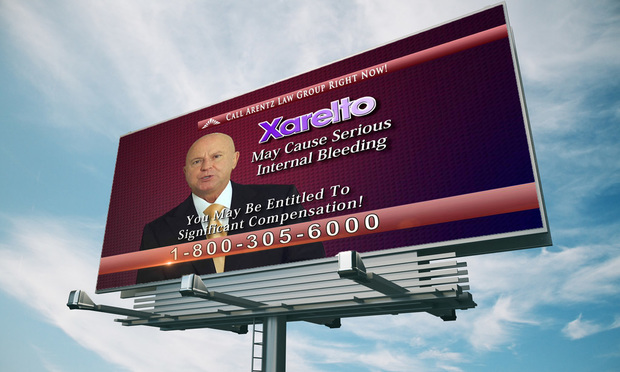In First, Chamber Calls for FTC and FDA to Regulate Attorney Drug Ads
The U.S. Chamber of Commerce says there's a lack of oversight for drug and medical device lawsuit advertising that must be addressed.
October 24, 2017 at 09:01 PM
5 minute read

It's rare to see the Chamber of Commerce advocate in favor of more regulation, but in a new report released Tuesday, the powerful business lobby is urging the government to step in and regulate attorney advertising.
The report from the U.S. Chamber's Institute for Legal Reform said television and internet advertisements by attorneys encouraging viewers to file lawsuits against prescription drug and medical device companies are on the rise. The Chamber called on the Federal Trade Commission and the U.S. Food and Drug Administration to label the ads “unfair or deceptive” under the FTC Act. It's the first time the Chamber has pushed for government oversight of the ads. The group claims they harm patients by dissuading them from taking prescribed medicines and treatments.
“While the purpose of such ads may be to inform injured people of their legal rights, misleading
information frightens viewers into stopping their medications and may deter others from seeking treatment,” the report said.
Currently, state bar associations have oversight over any misleading attorney advertisements, handling complaints filed in individual jurisdictions. The report said that while bar associations have rules governing some parts of attorney advertising, they don't actively monitor the process, and that the FTC “has generally taken a hands-off approach to lawyer advertising practices” by deferring to the state bars.
The report said the FTC, along with the FDA, should adopt regulations that specifically address misleading lawsuit advertising. Ads that would fall under the category would include those that present themselves as a “medical alert” or “health alert,” display the logo of the FDA or other government agencies, indicate a product has been recalled when it hasn't, or fail to inform the viewer of the identity of the ad's sponsor. The report also said Congress should give the FDA authority to monitor lawsuit advertising.
The Chamber began advocating against the ads last year, and the House Judiciary Committee held a hearing in June. Committee chairman Bob Goodlatte also sent letters in March to state bar associations urging them to block attorneys from airing ads that might cause patients to stop prescribed treatments. In addition to the Chamber of Commerce, the American Medical Association, which lobbies on behalf of doctors, also advocates for greater regulation of attorney advertisements. During the June hearing, two doctors told lawmakers they had patients who stopped taking prescribed medicines after seeing the ads.
In response to Goodlatte's inquiry, then-American Bar Association president Linda Klein said in a letter that false or misleading advertisements by lawyers are already regulated, using the same standard the AMA applies to physician advertising.
“The ABA appreciates your interest in this subject and your concern about individuals who might be harmed when discontinuing a course of medication because a consumer misunderstands a lawyer's advertisement,” Klein wrote to Goodlatte. “We hope that you share our interest in ensuring that individuals who are injured or killed each year by taking prescribed medications, or their survivors, are able to obtain information about their legal rights and engage counsel to seek redress if supported by the law and facts in each case.”
Bob Goldwater, an Arizona-based personal injury attorney whose firm spent roughly $25 million on ads targeting Xarelto and other drugs last year, said in an email to the National Law Journal that Goodlatte and the Chamber are just trying to protect drug companies from getting sued. He said both Goodlatte and the AMA cited a study to back their claims about the harmful effects of the ads, but the study was funded by Xarelto-owner Janssen Pharmaceuticals Inc. and the lead author, Dr. Paul Burton, works for Janssen. The company is facing thousands of lawsuits over the drug.
“It is very important that people know the dangerous side effects that drugs have,” Goldwater wrote. “Oftentimes, drug companies hide or underreport the side effects of their drugs to the FDA and the general public. … Unfortunately, Goodlatte and the business lobby are much [more] concerned about protecting the multibillion-dollar drug companies from getting sued over dangerous drugs.”
The Chamber's report, citing work by the research firm X Ante, said the number of lawsuit ads on television each year has tripled in the past decade. Between 2015 and 2017, ads recruiting clients for lawsuits against prescription drug and medical device manufacturers currently make up the largest share of lawsuit advertising, far outnumbering ads for asbestos, energy, automotive and agricultural product lawsuits, and lawsuit funding, the report said.
The report also suggested lawyers could use ads to influence jury pools. It noted that in 2016, the St. Louis area had the most attorney advertisements about potential adverse health effects from talc powder. The state courts in St. Louis are currently home to litigation against Johnson & Johnson related to claims its talc powder could cause ovarian cancer. However, the report said most plaintiffs in the talc cases live outside of Missouri.
“That raises the question: Are the TV ads in the St. Louis market ineffective in identifying clients or could the ads serve another purpose?” the report asks.
A spokesman for the American Association for Justice, the world's largest trial bar association, said that if consumers are harmed or killed by prescription drugs or devices, patients and families should know there are legal options to hold negligent companies accountable.
“In every state, attorneys must abide by ethical conduct, including rules on lawyer advertising,” the spokesman said. “These rules are based on the American Bar Association's Model Rules of Professional Conduct and expressly prohibit false or misleading advertising. If the relevant standards are met, attorneys have a First Amendment right to advertise their legal services just like other professionals.”
This content has been archived. It is available through our partners, LexisNexis® and Bloomberg Law.
To view this content, please continue to their sites.
Not a Lexis Subscriber?
Subscribe Now
Not a Bloomberg Law Subscriber?
Subscribe Now
NOT FOR REPRINT
© 2025 ALM Global, LLC, All Rights Reserved. Request academic re-use from www.copyright.com. All other uses, submit a request to [email protected]. For more information visit Asset & Logo Licensing.
You Might Like
View All
Am Law 100 Lateral Partner Hiring Rose in 2024: Report


Trending Stories
- 1Uber Files RICO Suit Against Plaintiff-Side Firms Alleging Fraudulent Injury Claims
- 2The Law Firm Disrupted: Scrutinizing the Elephant More Than the Mouse
- 3Inherent Diminished Value Damages Unavailable to 3rd-Party Claimants, Court Says
- 4Pa. Defense Firm Sued by Client Over Ex-Eagles Player's $43.5M Med Mal Win
- 5Losses Mount at Morris Manning, but Departing Ex-Chair Stays Bullish About His Old Firm's Future
Who Got The Work
J. Brugh Lower of Gibbons has entered an appearance for industrial equipment supplier Devco Corporation in a pending trademark infringement lawsuit. The suit, accusing the defendant of selling knock-off Graco products, was filed Dec. 18 in New Jersey District Court by Rivkin Radler on behalf of Graco Inc. and Graco Minnesota. The case, assigned to U.S. District Judge Zahid N. Quraishi, is 3:24-cv-11294, Graco Inc. et al v. Devco Corporation.
Who Got The Work
Rebecca Maller-Stein and Kent A. Yalowitz of Arnold & Porter Kaye Scholer have entered their appearances for Hanaco Venture Capital and its executives, Lior Prosor and David Frankel, in a pending securities lawsuit. The action, filed on Dec. 24 in New York Southern District Court by Zell, Aron & Co. on behalf of Goldeneye Advisors, accuses the defendants of negligently and fraudulently managing the plaintiff's $1 million investment. The case, assigned to U.S. District Judge Vernon S. Broderick, is 1:24-cv-09918, Goldeneye Advisors, LLC v. Hanaco Venture Capital, Ltd. et al.
Who Got The Work
Attorneys from A&O Shearman has stepped in as defense counsel for Toronto-Dominion Bank and other defendants in a pending securities class action. The suit, filed Dec. 11 in New York Southern District Court by Bleichmar Fonti & Auld, accuses the defendants of concealing the bank's 'pervasive' deficiencies in regards to its compliance with the Bank Secrecy Act and the quality of its anti-money laundering controls. The case, assigned to U.S. District Judge Arun Subramanian, is 1:24-cv-09445, Gonzalez v. The Toronto-Dominion Bank et al.
Who Got The Work
Crown Castle International, a Pennsylvania company providing shared communications infrastructure, has turned to Luke D. Wolf of Gordon Rees Scully Mansukhani to fend off a pending breach-of-contract lawsuit. The court action, filed Nov. 25 in Michigan Eastern District Court by Hooper Hathaway PC on behalf of The Town Residences LLC, accuses Crown Castle of failing to transfer approximately $30,000 in utility payments from T-Mobile in breach of a roof-top lease and assignment agreement. The case, assigned to U.S. District Judge Susan K. Declercq, is 2:24-cv-13131, The Town Residences LLC v. T-Mobile US, Inc. et al.
Who Got The Work
Wilfred P. Coronato and Daniel M. Schwartz of McCarter & English have stepped in as defense counsel to Electrolux Home Products Inc. in a pending product liability lawsuit. The court action, filed Nov. 26 in New York Eastern District Court by Poulos Lopiccolo PC and Nagel Rice LLP on behalf of David Stern, alleges that the defendant's refrigerators’ drawers and shelving repeatedly break and fall apart within months after purchase. The case, assigned to U.S. District Judge Joan M. Azrack, is 2:24-cv-08204, Stern v. Electrolux Home Products, Inc.
Featured Firms
Law Offices of Gary Martin Hays & Associates, P.C.
(470) 294-1674
Law Offices of Mark E. Salomone
(857) 444-6468
Smith & Hassler
(713) 739-1250









